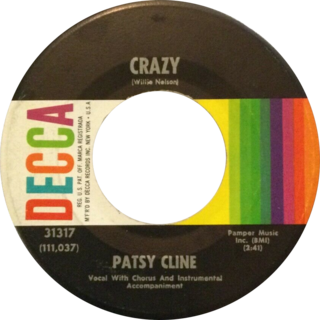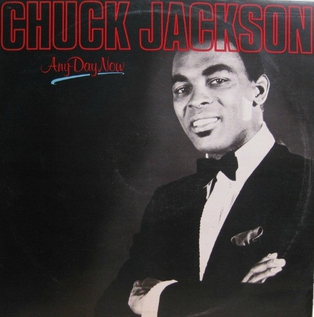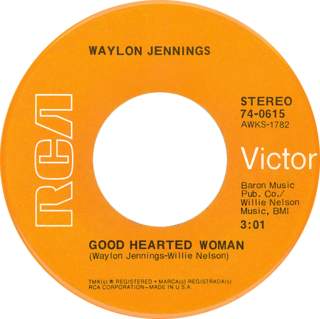Related Research Articles
"A Song for You" is a song written and originally recorded by rock singer and pianist Leon Russell for his first solo album Leon Russell, which was released in 1970 on Shelter Records. A slow, pained plea for forgiveness and understanding from an estranged lover, the tune is one of Russell's best-known compositions. Russell sang, played piano, and played tenor horn on the recording. It has been performed and recorded by over 200 artists, spanning many musical genres.The Encyclopedia of Country Music, 2012: "In 1970 Russell released his self-titled debut solo album, including such enduring songs as 'Delta Lady' and 'A Song for You,' both written for versatile vocalist Rita Coolidge.

"Crazy" is a song written by Willie Nelson and popularized by country singer Patsy Cline in 1961. Nelson wrote the song while living in Houston, working for Pappy Daily's label D Records. He was also a radio DJ and performed in clubs. Nelson then moved to Nashville, Tennessee, working as a writer for Pamper Music. Through Hank Cochran, the song reached Patsy Cline. After her original recording and release, Cline's version reached number two on Billboard's Hot Country Singles, also crossing to the pop chart as a top 10 single.
This is a list of notable events in country music that took place in the year 1980.

"Angel of the Morning" is a popular song written by Chip Taylor, originally recorded by Evie Sands but which first charted with a version by Merrilee Rush. The song has been covered by many artists including Chrissie Hynde, Dusty Springfield, P. P. Arnold, Connie Eaton, Mary Mason, Guys 'n' Dolls, Melba Montgomery, Olivia Newton-John and Juice Newton.

"If God Will Send His Angels" is a song by Irish rock band U2. It is the fourth track on their 1997 album, Pop, and was released as its fifth single on 8 December 1997. It was also featured on the City of Angels soundtrack.

"You Light Up My Life" is a ballad written by Joseph Brooks, and originally recorded by Kasey Cisyk for the soundtrack album to the 1977 film of the same title. The song was lip synced in the film by its lead actress, Didi Conn. The best-known cover version of the song is a cover by Debby Boone, the daughter of singer Pat Boone. It held the No. 1 position on the Billboard Hot 100 chart for ten consecutive weeks in 1977 and topped Record World magazine's Top 100 Singles Chart for a record 13 weeks.

"Blue Eyes Crying in the Rain" is a song written by songwriter Fred Rose. First recorded by Elton Britt in 1946, then made more popular by Roy Acuff in 1947, the song has been covered by many artists, including Hank Williams Sr., Johnny Russell, Charley Pride, and Elvis Presley. Most notably, the song was recorded by Willie Nelson as part of his 1975 album Red Headed Stranger. Both the song and album revived Nelson's success as a singer and recording artist.
"That Lucky Old Sun (Just Rolls Around Heaven All Day)" is a 1949 popular song with music by Beasley Smith and words by Haven Gillespie.
"On the Road Again" is a song written and recorded by American country music singer Willie Nelson.

"Any Day Now" is a popular song written by Burt Bacharach and Bob Hilliard in 1962. It has been recorded by numerous artists over the years, including notable versions by Chuck Jackson in 1962, Alan Price in 1965, Elvis Presley in 1969, Scott Walker in 1973 and Ronnie Milsap in 1982. In the lyrics, the singer predicts the imminent demise of a romantic relationship and describes the sadness this will leave.

The discography of American country artist Jeannie Seely contains 17 studio albums, four compilation albums, one soundtrack album, four music videos, 17 album appearances and 36 singles. Her first singles were for the Challenge label before 1966's "Don't Touch Me". The latter reached number two on the US Billboard Hot Country Singles chart and her only single to reach the Billboard Hot 100, peaking at number 85. The song was included on her debut studio album titled The Seely Style (1966), which reached number eight on the US Billboard Top Country Albums chart.
"Fraulein" is a 1957 song written by Lawton Williams and sung by Bobby Helms. Released by Decca Records that year, "Fraulein" was Helms's debut single on the U.S. country chart, reaching #1 for four weeks and staying on chart for 52 weeks, the sixth longest song in country music history to spend over 50 weeks on the country singles chart. The song's popularity crossed over to the pop chart where "Fraulein" peaked at #36.
"After the Fire Is Gone" is a song written by L. E. White, and recorded by American country music artists Loretta Lynn and Conway Twitty as a duet. It was released in January 1971 as the only single from the LP We Only Make Believe. "After the Fire Is Gone" was the first number one on the U.S. country chart for Lynn and Twitty as a duo. It spent two weeks at number one and a total of 14 weeks on the chart. On the Billboard Hot 100, the single peaked at number 56. It also won a Grammy for Grammy Award for Best Country Performance by a Duo or Group with Vocal.

"Good Hearted Woman" is a song written by American country music singers Waylon Jennings and Willie Nelson.
"Seven Spanish Angels" is a song written by Troy Seals and Eddie Setser, and recorded by Ray Charles as a duet with Willie Nelson. It was released in November 1984 as a single from Charles' 1984 album Friendship. Charles and Nelson split the verses, with Charles singing the first and Nelson the second, Charles sang the first and second choruses with Nelson joining for the outro. It was also included on Nelson's 1985 compilation album Half Nelson. "Seven Spanish Angels" was the most successful of Charles' eight hits on the country chart. The single spent one week at number one and a total of twelve weeks on the country chart.

"Just to Satisfy You" is a song written by American country music singers Waylon Jennings and Don Bowman in 1963. Jennings included the song in his performing repertoire, and on radio, where the song became a local hit in Phoenix, Arizona.
"Lovin' Her Was Easier " is a song written, composed, first recorded, and first released by Kris Kristofferson. It was also recorded and released by Roger Miller, who included it on his album The Best of Roger Miller and released it as a single in July 1971. Ten years later, it was recorded by Tompall & the Glaser Brothers for the album Lovin' Her Was Easier.
"Rose Garden" is a song written in 1967 by American singer-songwriter Joe South. It was first recorded by Billy Joe Royal on his 1967 studio album Billy Joe Royal Featuring "Hush". Versions by South himself and Dobie Gray appeared shortly after the original. Gray's version became a minor hit in North America in 1969.

"Here We Go Again" is a country music standard written by Don Lanier and Red Steagall that first became notable as a rhythm and blues single by Ray Charles from his 1967 album Ray Charles Invites You to Listen. It was produced by Joe Adams for ABC Records/Tangerine Records. To date, this version of the song has been the biggest commercial success, spending twelve consecutive weeks on the US Billboard Hot 100 chart, peaking at number 15.
Kenneth Threadgill was an American country singer and tavern owner, who mentored the early Austin folk music scene that included Janis Joplin. He also lent his name to two nationally famous restaurant/bar venues.
References
- ↑ Whitburn, Joel (2004). The Billboard Book Of Top 40 Country Hits: 1944-2006, Second edition. Record Research. p. 245.
- ↑ "Willie Nelson Chart History (Hot Country Songs)". Billboard.
- ↑ "Image : RPM Weekly". Library and Archives Canada . July 17, 2013.